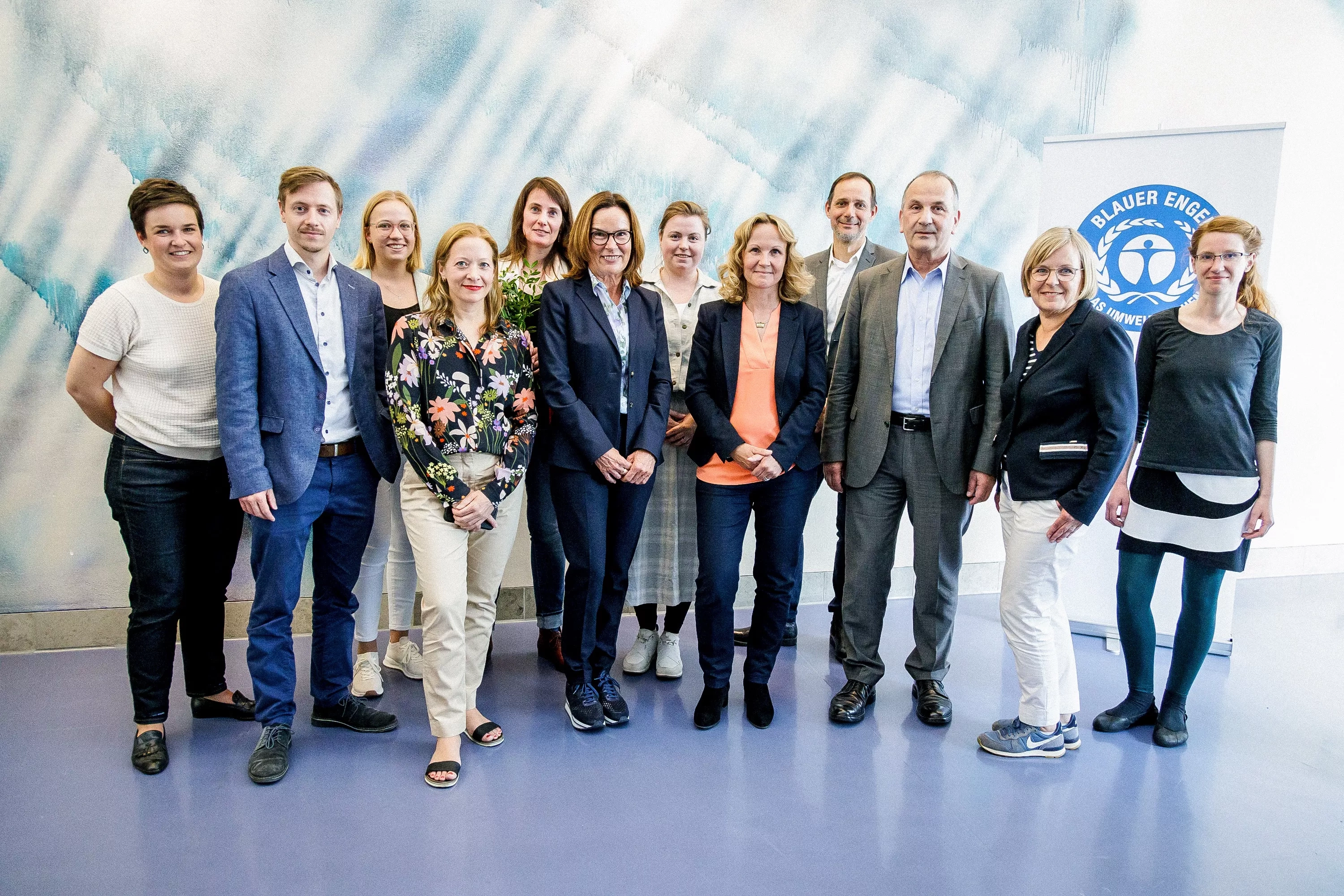Members of the Environmental Label Jury for the new term of office from 2022 to 2024.
Left to right: Kathrin Krause (vzbv), Jan Philipp Rohde (DGB), Anna Hartleif (AStA Bonn), Jelena Nikolic (HDE), Katharina Istel (NABU), Dr. Heike Buschhorn (Ministry for the Environment, Energy, Construction and Climate Protection of the State of Lower Saxony), Julia Römer (BUND), Steffi Lemke (BMUV), Dr. Axel Neisser (Stiftung Warentest), Prof. Dr. Mario Schmidt (Pforzheim University), Claudia Voss (BDI) and Dorothee Rodenhäuser (FEST e.V.)
The ENVIRONMENTAL LABEL JURY is the independent decision-making body for the Blue Angel. It de-cides which groups of products and services should be awarded the Blue Angel. In addition, it discuss-es and approves the relevant Basic Award Criteria that are developed by the German Environment Agency. The members of the jury act independently and autonomously and membership is voluntary.
The jury consists of 14 natural persons who are appointed by the German Environment Minister.
Katharina Istel from NABU was elected as Chairperson and Prof. Dr. Mario Schmidt from Pforzheim University / Institute for Industrial Ecology (INEC) as Deputy Chairperson of the Environmental Label Jury.
The Environmental Label Jury approved the Basic Award Criteria for three new environmental labels at its first meeting:
- Last mile delivery services
- Low-pollutant façade paints
- Roof and sealing sheets
Last mile delivery services
The number of packages delivered by courier, express and parcel (CEP) services each year is growing continuously and more than 4 billion packages were delivered in 2020. The transport processes that are required due to this growth in deliveries generate greenhouse gas, particulate and NOx emissions, as well as causing noise and other environmental impacts. A relevant portion of these environmental impacts are caused during the so-called “last mile” – i.e. the last section of the journey – when trans-porting the package e.g. from a parcel centre to the recipient in a 3.5 tonne delivery van.
The new ecolabel will be awarded to delivery services that clearly stand out with respect to environ-mental aspects and their use of public space during this last mile of the delivery in comparison to other delivery services.
Alongside the use of low-emission vehicles, the ecolabel also focuses on measures to avoid multiple deliveries that are damaging to the environment, especially the options offered to customers with re-spect to the time and place of delivery. In particular, the use of alternative collection points (such as parcel stations, parcel shops, etc.) located near to the customer that can be reached without a car have great potential to reduce the burden on the environment.
In addition, the ecolabel prohibits delivery services from operating using unfavourable or dubious working conditions from a socio-political perspective.
The Blue Angel cannot be awarded to the various forms of instant or immediate delivery services that are problematic from an environmental point of view.
Retailers will be able to use the ecolabel in the future to actively offer their customers a delivery option that complies with the Blue Angel criteria in cooperation with delivery companies. The ecolabel will also be depicted with the following explanations:
- climate friendly on the last mile and
- low emissions and noise on the last mile
Low-pollutant façade paints
Exterior paints on façades are used as large-surface coating materials in the design of buildings and for their protection. Biocides are often used in coating systems designed for exterior areas to protect against algal and fungal growth. These biocides do not prevent this algal or fungal growth on the building façade but merely delay it and are washed out of the paint over time. The potential risk of these pollutants being released into the environment due to their large-scale application should be kept as low as possible from an environmental and health perspective. Therefore, the new ecolabel will be awarded to products without a protective biocidal film that are low in pollutants.
This ecolabel can be used to certify products that
- are produced without a biocidal film and
- contain a low level of pollutants.
Roof and sealing sheets
Roof and sealing sheets are used to seal flat and sloping roofs such as those found on green roofs, pa-tios, balconies, roof gardens and underground garages. However, they are also used to seal sprinkler tanks and ponds.
As they are installed over large areas and come into contact with the soil or (rain) water, it is im-portant to avoid the release of any pollutants in these products as far as possible. Therefore, the Blue Angel uses a surface leaching test to evaluate the release of pollutants from roof and sealing sheets.
This ecolabel can be used to certify products that have a
- low level of harmful materials,
- are water friendly and
- conserve resources.
The documents with the new criteria will be finalised over the next few weeks and will be made availa-ble as Basic Award Criteria. Manufacturers of particularly environmentally friendly products will be able to submit an application for the label.
The Environmental Label Jury also issued a new investigative order for concrete roof tiles.
About the Blue Angel
The Blue Angel has been the ecolabel of the German federal government for more than 40 years and the guide for sustainable purchasing. It is an independent and credible label that sets stringent standards for environmentally friendly products and services. The Blue Angel guarantees that the products or services it certifies meet high standards when it comes to its environmental, health and performance characteristics. The whole life cycle of the product or service is always taken into account in the assessment process. Criteria are developed for each product group and must be complied with by those products and services holding the Blue Angel. In order to reflect any technological developments, the German Environment Agency checks the criteria every three to four years. This ensures that companies are required to make their products even more environmentally friendly over time.



